David McFall R.A. (1919 - 1988)
Sculptor
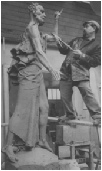
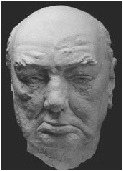
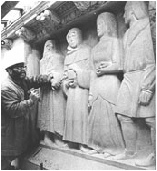
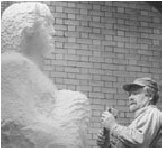
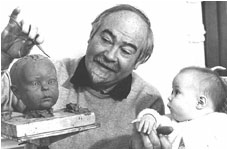
1948/4 Inscription at Spicer’s New Bridge Street
Carved inscription on stone
Commissioned by the Spicer Paper Company for their premises at New Bridge Street,
London
The inscription is ‘Song by the Sub-Conscious Self‘ from Andrew Lang’s ‘Ban and Arriere Ban:
A Rally of Fugitive Rhymes’ published by Longmans, Green & Co., London, 1894 (page no. 75)
Song by the Sub-Conscious Self
RHYMES MADE IN A DREAM
I know not what my secret is,
I know but it is mine;
I know to dwell with it were bliss,
To die for it divine.
I cannot yield it in a kiss,
Nor breathe it in a sigh.
I know that I have lived for this;
For this, my love, I die.
[interesting that someone changed the Lang words “I know that I
have lived for this” to
“Enough that I have lived for this” in the penultimate line]
Andrew Lang (1844-1912), Scottish historian, translator, journalist, lecturer, biographer, anthropologist,
poet, and author. An avid folklorist, Lang's Fairy Book series contain dozens of fairy tales, myths, fables,
legends, and nursery rhymes including "Little Red Riding Hood", "Story of Wali Dad the Simple-Hearted", "The
Story of Three Bears", "The Goblin Pony", "The Story of a Very Bad Boy", "The Groac'h of the Isle of Lok", "The
Ugly Duckling", "The Snow Queen", "The Norka", "Rapunzel", "Schippeitaro", and "The Emperor's New Clothes".
Lang often collaborated with his wife Leonore Blanche Alleyne in adapting and translating the stories,
originating from numerous countries.
Lang was also a prolific author of works both fiction and non-; he wrote his own fairy tales such as Prince Prigio (1889) and Prince Ricardo of Pantouflia (1893), and wrote numerous historical texts including A Short History of Scotland (1911). His collected works include essays on religion, myths, the noble savage, and magic under such titles as Custom and Myth (1884), Myth, Ritual, and Religion (1886), and The Making of Religion (1900). Andrew Lang was great friends with Robert Louis Stevenson and H. Rider Haggard, with whom he wrote The World's Desire (1890). Preferring romance over realism, he admired their works as well as those of Alexandre Dumas Père, Henry Fielding, William Makepeace Thackeray, fellow Scot Robert Burns and many others.
Andrew Lang was born in Selkirk, Scotland on 31 March 1844, eldest son of Jane Plenderleath Sellar and John Lang. Young Andrew's education started at the Selkirk Grammar School; he then went on to attend Edinburgh Academy. He next attended University of St. Andrews, which now hosts the Andrew Lang Lecture series in his honour. Lang then went to Balliol College, Oxford, England. His Oxford: Brief Historical and Descriptive Notes was published in 1880. He was Fellow of Merton College from 1865 to 1874. Lang studied Latin and Greek, especially the Homeric texts, and began translations from the French the poetry of François Villon, Pierre de Ronsard, and others. Lang was also writing his own poetry, Ballads and Lyrics of Old France (1872) his first publication. Other poetry collections include Ballads in Blue China (1880), Helen of Troy (1882), Rhymes à la Mode (1884), Grass of Parnassus (1888), Ban and Arriere Ban (1894), and New Collected Rhymes (1905).
Lang's childhood days in the Scottish Borderland of Selkirk, the land and history of William Wallace and Bonnie Prince Charlie and his Highlanders, his jaunts through heath and wood, fishing in the local streams, and reading such books as Grimm's Fairy Tales and the works of William Shakespeare, Madame d'Aulnoy, and Sir Walter Scott inspired his love of folklore, magic, and myth. Lang moved to London in 1875 to try his hand at journalism, the same year he married Leonore Blanche Alleyne. They would have no children. While Lang was editor of and wrote a popular column for Longman's Magazine, he continued his prodigious output, with dozens of articles and essays published in newspapers and magazines including Cornhill Magazine, Macmillan's, The Daily Post, Fortnightly Review, the Overland Mail, Fraser's and Time magazine. His dry wit and sardonic style earned him much acclaim. He was an avid golfer and fisherman and he and Leonore travelled to France and Italy.
Many honours were bestowed on Lang during his lifetime including Doctorates in Classics from the University of St. Andrews and Oxford, in 1885 and 1904 respectively. He was Gilford lecturer at St. Andrews in 1888. In 1911 he was voted President of the Psychical Research Society. After many years of ill-health, Andrew Lang died on 20 July 1912 in Aberdeen, Scotland. He now rests in the cathedral precincts of St. Andrews.
All rights reserved
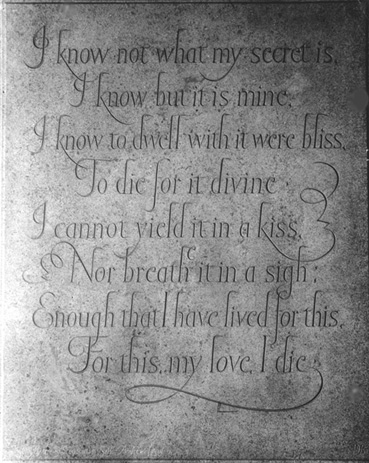

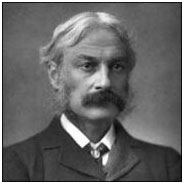
| Animals |
| Busts and Heads |
| Children |
| Churchill studies |
| Lettering |
| Medals coins plates |
| Reliefs |
| Stone carvings |
| Contemporary British Artists |
| On Epstein |
| Picasso |
| The art of portrait sculpture |
| Letters |
| Palliser |
| Son of Man |
| Press |
| Obituaries |
| Memorial address |